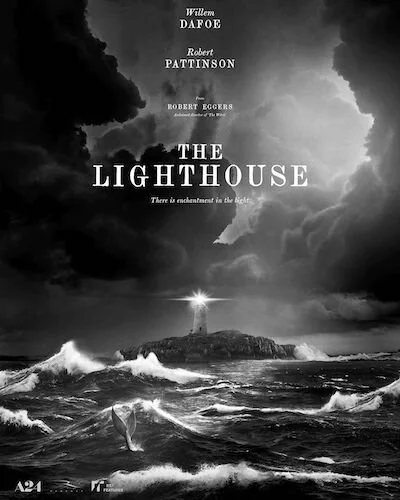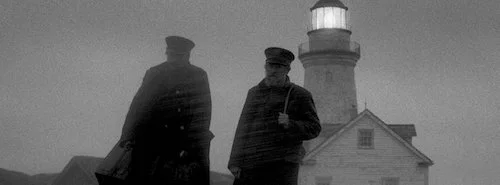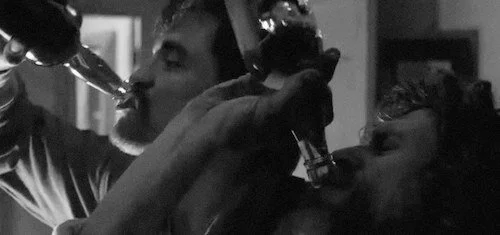The Lighthouse
If you were excited about the future of horror when Robert Eggers unleashed The Witch, I don’t think anything has prepared you for The Lighthouse: an even more claustrophobic, insane, mind scrambling experiment that uses the tropes of the oldest horror films to bring new life to the genre. You know exactly what you have signed up for: two seabirds trapped in a lighthouse for four weeks that slowly grow insane. You know this. What you don’t expect is just how far The Lighthouse is willing to go. I’m talking pseudo-Persona levels of foundation shattering. There are points that almost feel like the film itself is breaking. It’s all a jolly good time.
Eggers took some inspiration from a real story of two lighthouse keepers named Thomas that hated each other. Without saying too much (as to not spoil this own film), there are barely any similarities between the source material and Eggers’ own screenplay (which he co-wrote with his brother Max Eggers). Like the novel (and film) for The Revenant took the Hugh Glass and extended the thresholds, The Lighthouse similarly nods in agreement with the starting point, and continues to run as far away as possible while still looking back. We still have two sea craving men stuck in a lighthouse for four weeks. They still hate each other. That’s about it.
With this kind of a setting, you know these two were doomed from the start.
The elder keeper Thomas (Willem Dafoe) is a hard-as-nails bard that spins tales of old and spews orders at will. The newcomer Ephraim Winslow (Robert Pattinson) wished to leave a world of trees for the sea life, and has much to learn of his new surroundings. Right off the bat, Thomas does not value Ephraim’s naivety, and Ephraim disapproves Thomas’s tactless ways. You can make some sort of a comparison with the boomer vs. millennial debate we’ve seen a lot lately (and who is the bigger special snowflake of the two), and you wouldn’t be far off. You can also just boil this down to experience battling youth, or simply just two unlikeable men forced to make do with each other. Any analysis works here.
The Lighthouse works heavily with themes. These include the actual light emitting from the house, the power of water (through waves, rain, or liquid consumption and expulsion), and seagulls (can’t forget those seagulls). What’s also nice is how there is still barely a semblance of a plot, even in a film as reliant on its basic premise working on its own. You get some revelations through the more personal moments between the two leads: the rare times they are actually at peace with one another. Sometimes, these moments are clues as to how far we’ve already deteriorated in this film (and the mind goes quite rapidly here).
Alcohol is the means of knocking down any personal barricades the two main characters hold up.
Influenced by the classic horror films (I’m talking even the silent era), Eggers shot The Lighthouse with very specific means that are highly unorthodox for a 2019 film. I’m talking a blocky 1.19:1 aspect ratio, the entire film shot on 35mm black and white stock, and what appears to be even a more time-accurate frame rate speed (unless my eyes were playing tricks on me, given the rest of the specs). Then we have the extreme German expressionistic close ups: eye shots, crazy architecture (mostly the spiral lighthouse staircase), and abstract imagery. The Lighthouse goes the whole nine yards, thanks to Eggers’ knowledge of both film history, and film making on a technical level. He can geek out in both ways here, and he makes sure to do so at all times.
We also have to be interested in who we’re stuck with for an hour and fifty minutes. I have two thoughts on that note. Firstly, Willen Dafoe is worthy of his third Academy Award nomination in as many years in a row (he’s not slowing down, folks) as the sea salt stained master whose voice sounds like the most devilish pirate to force you to scrub the deck. Secondly — and who would ever expect this —, Robert Pattinson deserves his first Academy Award nomination period. He goes to Leonardo DiCaprio lengths of commitment, between his physical detriments and his ability to hook you with whatever he says. Pattinson has come a long way, but I don’t think I ever expected him to be this in control of his craft.
There are times where Willem Dafoe is borderline unrecognizable in The Lighthouse.
So, we have some great aesthetic choices, and two strong lead performances, for this peculiar story. Alright. Let’s see how this ends up. The Lighthouse runs away with its strengths from very early on, so you’re bound to be glued to the screen almost immediately. What truly helps is that it never ever slows down. No. Actually, I’ll rephrase that. It never lets up at all. Down to the final screen (and, boy, is it a doozy), The Lighthouse never ever lets you think you are in safe hands at any given moment. For a reasonably long film featuring such a minimalist approach (two actors for most of the film, one key setting, and very little narrative progression), that’s quite a daring task. How much can you do with so little?
Well, apparently you can do a hell of a lot. The Lighthouse uses the perversions, addictions, vices and fears of the two keepers as the spices to kick this meal up a notch. We get into the notion of hallucinatory visions rather quickly, but that doesn’t render them stale. They get crazier, and they get more harmful towards the film’s own stability. There are times where I had to take a second to reflect on something I heard or saw, and wonder “Was I wrong about this element the entire film?”. Then I quickly remembered “Oh, right… Robert Eggers is messing with me”. The film does more than just cave in on itself: it tricks you into doubting your own experience with watching the film the first time you do so.
Visual representations of fear and delusion quickly turn the film into an intentional mess, and it’s glorious.
The Lighthouse is cabin fever portrayed exceptionally well. It does rely on all of its elements to work, and luckily everyone (cast and crew) is clearly at their top form here. As a result, not one second of The Lighthouse feels like a waste or a weird experiment choice (no matter how vulnerable, awkward, or disgusting the film gets). You know you’re in for a wild time, but just be prepared for an experience that’s as exhilarating as it is eviscerating. By stripping film of its evolutions, and people of their dignity and consciousness, The Lighthouse becomes one of 2019’s craziest achievements (and a bar set impossibly high by Robert Eggers).
Andreas Babiolakis has a Masters degree in Film and Photography Preservation and Collections management from Ryerson University, as well as a Bachelors degree in Cinema Studies from York University. His favourite times of year are the Criterion Collection flash sales and the annual Toronto International Film Festival.









